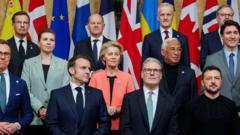Despite recent advancements, Sir Keir Starmer's proposed coalition aimed at securing peace in Ukraine reveals significant uncertainties, particularly regarding U.S. support, as new military pressures mount on Kyiv.
Starmer's Coalition Faces Challenges in Ensuring Peace in Ukraine

Starmer's Coalition Faces Challenges in Ensuring Peace in Ukraine
UK Prime Minister Sir Keir Starmer's initiative for a "coalition of the willing" to support Ukraine encounters complex hurdles amid fluctuating international relations.
UK Prime Minister Sir Keir Starmer has stated that a "huge amount" has transpired since his proposal for a "coalition of the willing" was introduced during a summit at Lancaster House two weeks prior. Indeed, the dynamics of U.S.-Ukrainian relations have witnessed significant changes, notably following a recent meeting in Riyadh that resulted in a 30-day ceasefire agreement. However, the coalition that Starmer envisions remains broad and ill-defined, indicating that substantial efforts are needed before it can effectively manage the complex task of maintaining peace in Ukraine.
At the virtual summit involving 29 global leaders, Starmer noted the enlargement of the coalition and hinted at "new commitments," though he refrained from providing specifics. Participants unanimously agreed to continue military support for Ukraine and to impose stricter sanctions on Russia to undermine President Vladimir Putin's military operations. As planning transitions to an "operational phase," military leaders are scheduled for discussions in the UK next Thursday.
Momentum is building, but challenges loom large. When pressed about critical U.S. military backing necessary for any European-led mission, Starmer confirmed that the U.S. stance had remained unchanged. European national security advisors, including Jonathan Powell—credited with persuading President Volodymyr Zelensky to consider the U.S. ceasefire proposal—were recently in Washington.
Without a shift in President Donald Trump's position on U.S. support, which acts as a potential "backstop," Starmer's coalition may find it difficult to take off. Meanwhile, time is of the essence for Zelensky, as Ukrainian forces in regions like Kursk face mounting pressures; reports suggest they are holding onto diminishing territory since August 2024.
While Ukraine has rejected claims of its troops being encircled in Kursk—a narrative echoed by Trump—it is evident that they are grappling with formidable challenges. As peace negotiations loom, the territory serves as a bargain chip, one which Putin seems intent on eliminating before meaningful talks can commence. This dynamic may explain Putin's ambivalent stance toward the proposed ceasefire initiative.




















